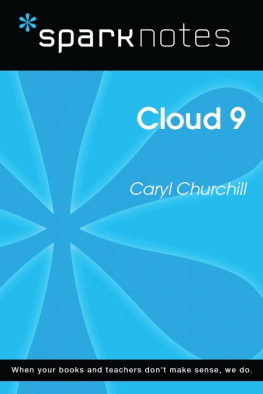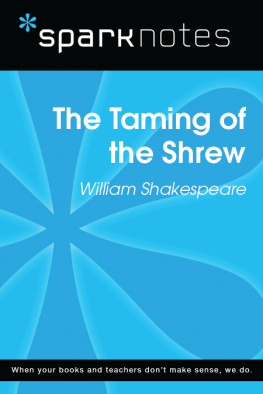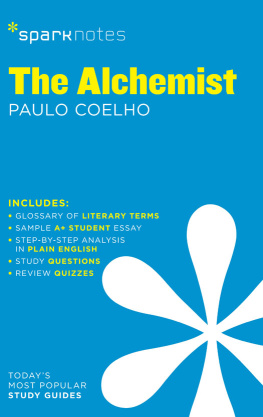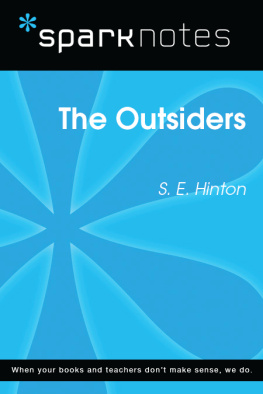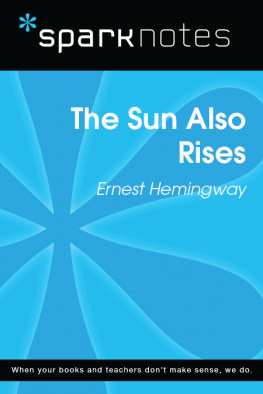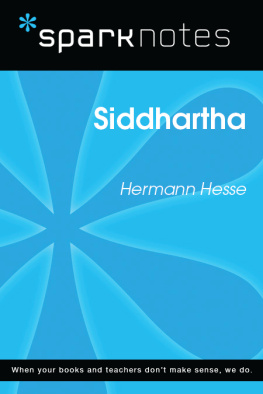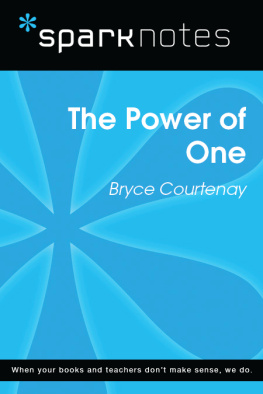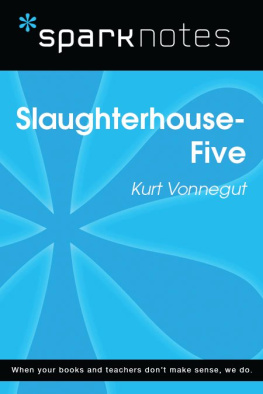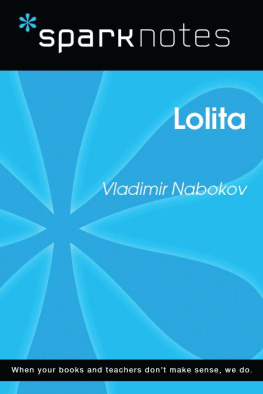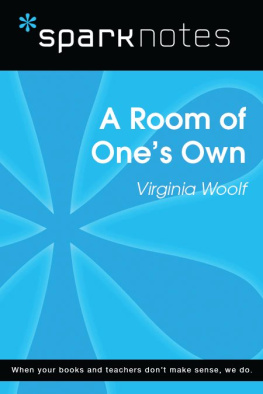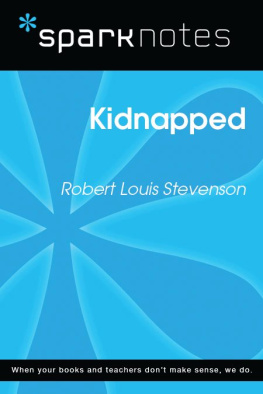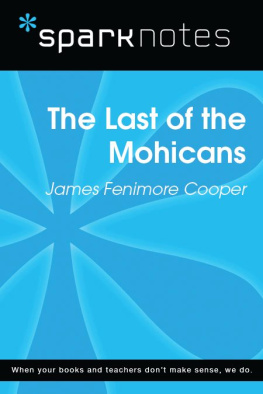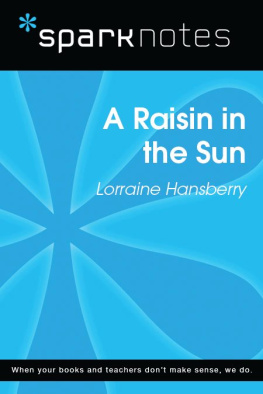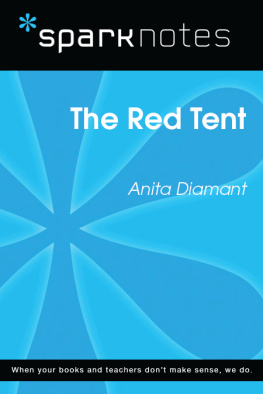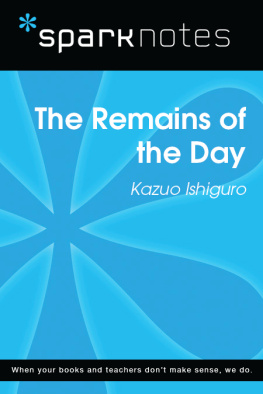Cloud 9
Caryl Churchill
2003, 2007 by Spark Publishing
This Spark Publishing edition 2014 by SparkNotes LLC, an Affiliate of Barnes & Noble
All rights reserved. No part of this publication may be reproduced, stored in a retrieval system, or transmitted in any form or by any means (including electronic, mechanical, photocopying, recording, or otherwise) without prior written permission from the publisher.
Sparknotes is a registered trademark of SparkNotes LLC
Spark Publishing
A Division of Barnes & Noble
120 Fifth Avenue
New York, NY 10011
www.sparknotes.com /
ISBN-13: 978-1-4114-7447-5
Please submit changes or report errors to www.sparknotes.com.
10 9 8 7 6 5 4 3 2 1
Context
Caryl Churchill was born in London in 1938. As the daughter of a cartoonist and a film actress, Churchill had early exposure to and an affinity for art. Churchill began with short stories and moved to playwriting in college. Her first plays were produced at Oxford, from which she graduated, with a Bachelor of Arts in English, in 1957.
In her post-college years, Churchill, a long-time Socialist, began to explore another then-radical political stance, feminism. However, not until the mid- 1970's did Churchill allow her political leanings to become the focus of her work. In Objections to Sex and Violence (1975), Churchill introduced themes of sexual repression and femininity, ideas that reappear in full force in Cloud 9 (1979). As her plays began to probe sensitive areas of sexual politics, Churchill's writing style evolved toward a less linear, more avant- garde form. She experimented with time manipulation, cross-gender casting, and different concepts for costuming and staging.
In 1976, Churchill partnered with the Joint Stock Company for the first time with Light Shining in Buckinghamshire. With Joint Stock, Churchill worked on a process of writing plays out of discussions and improvisations with actors and directors. In this approach, actors, director, and writer would first spend several weeks rehearsing without a script. Then, Churchill would spend time alone writing from her experiences in the workshop before coming back to the company with a script. Churchill applied this process to her second collaboration with Joint Stock, Cloud 9.
Churchill's approach to Cloud nine was not strictly feminist. She began with the more general concept of sexual repression and how any person can feel its effects. For her settings, Churchill selected two different repressive periods in British history. The first act takes place in Africa, roughly during the 1870's during the British Victorian era (Churchill deliberately avoids giving the audience any specific dates). During this time period, British colonialism was still in full swing. Churchill uses the notion of Britain's responsibility to civilize colonial cultures as a backdrop for Act II, which takes place in London around 1979. By this time period, British colonialism had all but completely deflated, but other forms of repression remained.
1979 marked a unique period of sexual revolution in London, a period distinct from the Victorian era in many ways. Homosexuals, though far from completely welcome, had established a presence in the cultural landscape of British society. Divorce had become acceptable, and women had gained new freedoms and greater status. In some sense, Churchill tosses the characters from Act I into this new arena to see how they might react.
Churchill's actor-based approach to writing Cloud 9 resulted in a piece very much centered around bodies and actors in space. Audiences are forced to recognize that men play women, women play men, and adults play children. The exercises used by the Joint Stock Company to create the basis for the text are designed to present the writer with different ideas of status and of how the actors might work best together in a scripted work. These influences are highly evident in Cloud 9.
Plot Overview
Clive, his wife Betty, son Edward, daughter Victoria, mother-in- law Maud, governess Ellen and servant Joshua welcome the audience to his African home with a song paying tribute to England. Out of the song, the action of the play begins quickly. Clive returns home after spending the day managing the troubles among local tribes. Betty greets him and they swap stories about their days' experiences. When Clive learns that Joshua has been rude to Betty, he scolds Joshua. After this scolding, Clive greets the rest of his family, asking his children about their daily activities. After some pleasant discussion, the family welcomes Harry Bagley and Mrs. Saunders. Harry, an explorer, visits the family between expeditions. Mrs. Saunders, a widow, arrives exhausted, seeking protection from the natives. Betty and Harry flirt, revealing their attraction for one another. Later, Harry asks Joshua to have sex with him, and they leave for the barn together.
Clive chases Mrs. Saunders away from the house, and, after a brief argument, performs oral sex on her. To escape suspicion, they quickly return to the family's Christmas picnic, where Clive toasts the Queen. Clive and Harry toss a ball with Edward until Clive becomes frustrated with Edward's clumsiness. The game of ball gives way to a game of hide and seek, during which Edward and Harry reveal that they have a sexual history. Edward hopes to rekindle this relationship, but Harry is hesitant to approve. Meanwhile, Ellen professes her love for Betty. Betty, still smitten with Harry, dismisses Ellen's comments as ridiculous.
Later, Clive and the men flog the natives as the women wait inside the house. Mrs. Saunders, disapproving, leaves to find out what exactly the men are doing. Ellen becomes angry with Edward for playing with a doll and slaps him. When Clive returns from the flogging, Edward apologizes for playing with the doll and asks his father for forgiveness. When all but Betty and Clive leave for the verandah, Clive tells Betty that he knows about her affair with Harry. He lectures her on the necessity to resist lust, and then he forgives her.
As tension grows among the natives, Clive finds a moment alone with Harry to tell Harry about the increasing dangers. Harry makes a pass at Clive, and Clive reacts with horror, offended by Harry's homosexuality. Seeking a cure for Harry's perversity, Clive attempts to marry Harry to Mrs. Saunders. She refuses the offer. News that Joshua's parents have been killed by British troops distracts Clive momentarily, as he offers his condolences to Joshua. When Clive turns his attention back to Harry, he forces an engagement between Harry and Ellen. At the wedding party that follows, Mrs. Saunders announces that she is leaving, but before she can exit, Clive kisses her, prompting a fight between Mrs. Saunders and Betty. Disgusted at Mrs. Saunders behavior, Clive kicks her out of the house. When Clive goes to toast the newly engaged couple, Joshua raises a gun to shoot Clive. Edward sees this action, but does not warn Clive.
Roughly one hundred years later, Victoria appears in a London park on a winter afternoon with Lin and Lin's daughter Cathy. When Cathy exits to play elsewhere, Lin informs Victoria that she is a lesbian, and she asks Victoria to go to a movie with her. Edward, now a gardener, joins the two women, followed by Betty, who rambles at length about raising children. Betty also mentions that she is considering leaving Clive. Betty lets Cathy play with her jewelry. (Note: For the second act of the play, which takes place in London, actors switch roles. For instance, Betty in London is played by a different actor than Betty in Africa. See Characters.)

